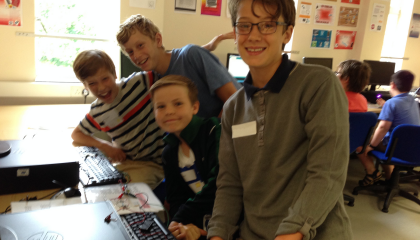SEN
CAS #include aims to help teachers make Computer Science accessible for all young people, regardless of their abilities and needs. Students with Special Educational Needs in mainstream schools, for example dyslexia and communication difficulties, may be very capable programmers, with targeted support and a careful choice of language. Computational thinking provides an excellent way of teaching problem solving skills in interesting ways that can be relevant across the curriculum. For example sequencing, identifying errors and finding patterns, that many students with special needs find challenging, or decomposition as a way of making a problem easier to deal with.

For students working below National Curriculum levels, there is an argument for teaching computer science as a way of improving and supporting literacy and numeracy, as well as promoting a problem-solving approach using technology. At this level, whatever is taught needs to be relevant to the needs of the pupil, but this can mean teaching sequences of instructions for an essential everyday skill such as catching the bus, making a cup of tea, or practising counting using a number mat with a floor robot.
Mark Dorling recorded a video about his experience as a dyslexic and how computational thinking has helped him:
Events
- We regularly run Diversity in Computing conferences that include workshops on supporting SEN pupils.
- We have funded equipment to support workshops for students with communication difficulties to learn about programming through Minecraft on the Raspberry Pi in Manchester (learn more).
- We supported the recent SEND Computing Conference at the National STEM Centre in York - you can read a blog about it here.
Resources
Resources can be accessed from our SEN Resources page.
- There is a collection of ideas for teaching Computing to SEND pupils at: http://sencomputing.wikispaces.com/
Any further contributions welcome. This also has a page linking to resources gathered at the SEND Computing Conference in Dec 2015. - Computing ITT and CPD - A collection of teacher-curated resources to deliver the new computing curriculum. Includes a Special Educational Needs and Disabilities page with links to resources, equipment and research.
- Barefoot Computing Project - A collection of resources to help teachers of Computing, including resources explaining the key computational thinking concepts, and some new teaching activities aimed at teachers of students with SEN.
- Somerset County Council ELIM SEND Computing Resources - Some excellent resources from the eLearning and Information Management Team, including Computational Thinking for SEN, and Programming Progression for Learners with Complex Needs. There is some additional information on SEND here.
- http://sheffieldclc.net/ has some Scratch resources for SEND under the Resources tab, both to use as a resource for teaching computational thinking, and also for introducing Scratch.
- http://gesturesen.wikispaces.com is a very useful wiki on a number of gesture-based technologies for those students with severe and profound learning difficulties, who won’t be able to access the Computing curriculum, but can have meaningful interactions with content through Eye Gaze, iPads, Kinect etc.
- Revised P Scales for Computing - a group of educators have been working on an alternative to the P Scales for Computing, which don’t really reflect the content of the new Programs of Study. The first draft of this can be viewed in our Resources section here, and will be useful for teachers wanting to know what Computing looks like for young people working at these levels.

